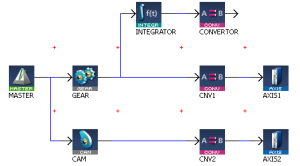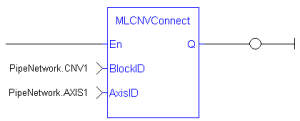 Function - Connects a converter Pipe Block to the specified axis.
Function - Connects a converter Pipe Block to the specified axis.
- Initializes the pipe position to the Convertor block output value.
- Adjusts the axis Pipe Offset so that no jump in motion is generated.
Inputs
|
Input |
Data Type |
Range |
Unit |
Default |
Description |
|---|---|---|---|---|---|
|
BlockID |
DINT |
-2147483648 to 2147483647 |
N/A |
No default |
ID number of an initiated Converter object. |
|
AxisID |
DINT |
-2147483648 to 2147483647 |
N/A |
No default |
ID number of an initiated Axis object. |
Outputs
|
Output |
Data Type |
Range |
Unit |
Description |
|---|---|---|---|---|
|
Default (.Q) |
BOOL |
FALSE, TRUE |
N/A |
Returns TRUE if the converter is connected to the Axis object. See Function - General Rules. |
Remarks
-
-
This function or function block returns cached data.
See Program a Multi-Core Controller.
- When using the Pipe Network for coordinated motion, Pipe Blocks have to be Activated, Connected, and then Powered On before move commands work.
- The Converter block changes the incoming flow of values to continuous position output with no periodicity.
- If a converter block is not connected to an Axis, it does not send position output values to its assigned Axis.
- Every pipe branch must end in a converter, whether or not it is connected to a destination Axis object.
Figure 1: MLCNVConnect
-
-
All converters in the Pipe Network can be connected at once with the command Pipe Network(MLPN_Connect).
This calls automatically generated code with MLCNVConnect commands for each Converter block.
In a multi-axis program only one command can be used to connect Pipe Blocks instead of writing code for each Axis separately.
-
-
The converter block has the ability to control the analog output on the AKD.
FBD Language Example
FFLD Language Example
IL Language Example
Not available.
ST Language Example
//Connect a converter Pipe Block named “CNV1” to Pipe Block AXIS1
MLCNVConnect( PipeNetwork.CNV1, AXIS1 );
See Also









